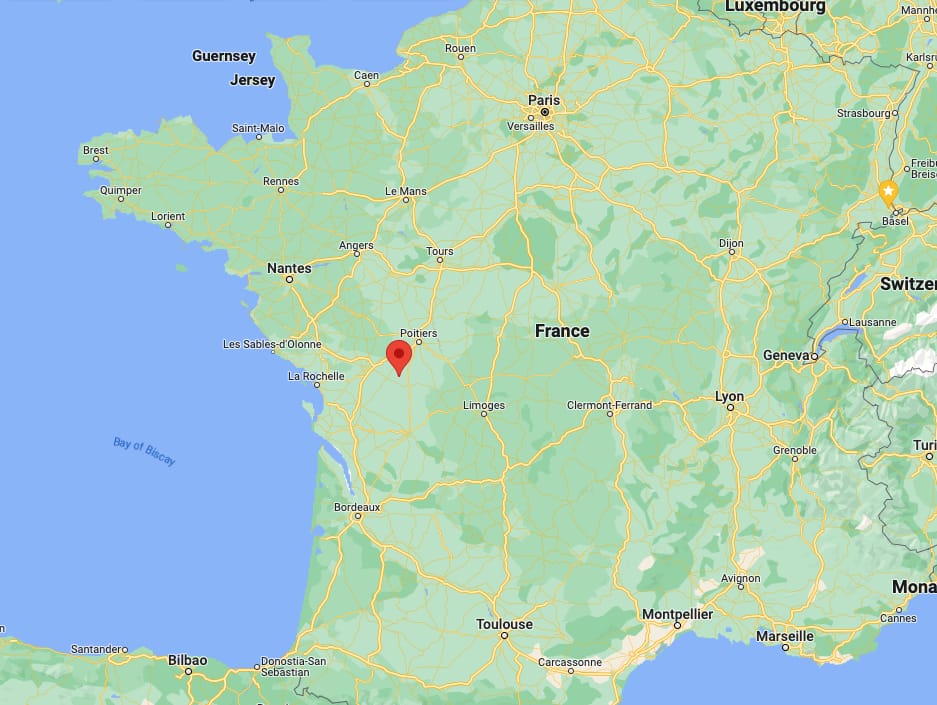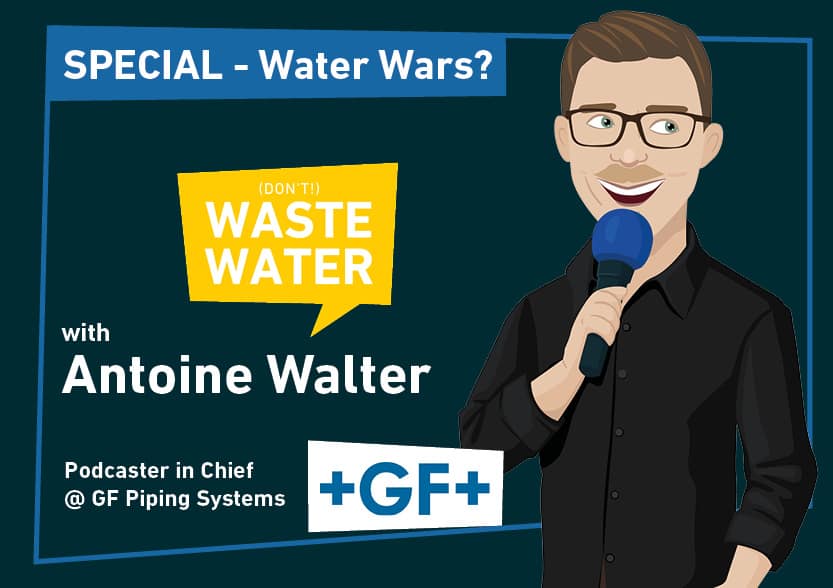Everybody predicted Water Wars would eventually happen one day, and for many places in the World, we’re far past the days where these conflicts would just be a concept. Yet, the scenes that we experienced in France over the past few days came as a surprise, in a water-rich first World country. What does it reveal?
with 🎙️ Antoine Walter, Podcaster in Chief at GF Piping Systems
Video – Water Wars in France?
Table of contents
War Scenes in Peaceful Western France
Police cars burning in a field next to an artificial reservoir, dozens of injured people both on the police and protester sides, politicians on all ends of the spectrum exchanging insults, journalists attacked, and policemen charging protesters riding quads and armed with batons.
Is it Karabagh and a new episode of high tensions between Azerbaijan and Armenia? Is it Palestina and a conflict peak with Israel? Or any other transboundary water tension we’ve heard of at the latest UN Water Conference?

Not at all. We’re in Sainte Soline, in the Western part of France. It is a simple example of the type of tensions we will experience around Water in the future, and it tells a lot about how unprepared we are to tackle it.
France doesn’t know enough yet about Water Scarcity
Unlike California or Australia, France for long didn’t have a sound knowledge of what Water Scarcity really means. So when it started hitting harder and repeatedly some years ago, it raised questions nobody really was ready to answer.
But farmers in the western region of the country we discuss today noticed a pattern: they had Water in the winter and much less so in the summer. Hence it didn’t take them too long to come up with an idea! What if they could store Water when they have plenty to have it at hand in case of drought?
In a nutshell, they’re reinventing a concept called snow.
Origins of a War: the Build up of Water Reservoirs
This is how, in 2019, they launched the project of a series of water reservoirs – 16 are to be built. Water shall be pumped from underground aquifers during winter, brought in these large above-ground basins, and wait calmly there until it gets used during summer.
But while the first one got erected and filled, protests became louder and louder.
Indeed, if the region doesn’t suffer from water scarcity in winter, it isn’t overabundant either. So, seeing a full water reservoir next to quite dry agricultural land irritated a lot of smaller farmers.
Isn’t it stupid to let Water evaporate in a Basin?
There’s also a debate between supporters and opponents on the evaporation of Water in the basins. A maximum of 10% of the Water shall disappear for the ones. For the others, it may be up to 60%, and the remaining stagnant Water might see tremendous quality drops.
A vivid debate also arose around the use made of that Water. Indeed, the region cultivates quite a lot of corn, which for the ones is a stupidly highly Water demanding thing to grow in a water-scarce region – quite true – for the others is a needed feedstock for their herds of goats and cows – quite true as well.
Last nail in the coffin: the entire project is subsidized at 70% by the french taxpayers. Mix it with a quite tense social context in France right now, an unpopular government, and a tradition of rioting ongoing for at least 250 years, and you have all the ingredients for the explosive situation we’ve seen over the past few days.
4 Riddles our World needs to Solve to combat Water Wars
Now, if we zoom out, that entire story reveals four fundamental riddles that no-one solved to date.
Let’s start with the broadest one: we have an open challenge as to how we will keep feeding the World.
1. How do we keep feeding the World?
Let’s picture the World as a village 25 years ago. There are 610 residents and a farmer. Doing his best, our farmer almost supplies food for the village, yet 10% of the people sometimes don’t get enough to eat.
Twenty-five years later, the village’s population has grown to 700. That doesn’t sound as much of a change, but the overall size of the village hasn’t grown, so that our farmer does not have more arable land either. And he’s got consistently less Water.
But that’s not the end: in 25 more years, the same village will reach 970 residents, which will eat up the arable land and further pressurize our farmer. He needs to increase its output by 50% with, at best, the same surface. It makes your organic food dream a bit less realistic, right?
Let me not insult your intelligence: you’ve recognized that my village’s analogy is Earth and its evolution from the beginning to the middle of this century. And there are much more parameters to bring into the equation.
Reducing food waste and increasing crop efficiency
For instance, we’re wasting 25% of the food that’s produced. We produce it, we ship it around the World, we distribute it, and we throw it away.
Then, we’re also not producing the most optimized crops in the most adapted place. In a theoretical reallocation of crops, Paolo d’Odorico and his team, for instance, showed how it was possible to multiply irrigation water’s value by at least four – and up to 8 in Asia.
So it’s safe to say that the riddle of food production is still wide open and unaddressed, and our little Sainte Soline example is only one of the thousands of symptoms of the problem we have started to observe.
2. How to predict the consequences of Water Reallocation?
Second riddle: what happens when you artificially reallocate Water? The proponents of the Water Reservoir project explain that the quantity of Water they’ve diverted into the first and only basin built so far is equivalent to what the neighbor river rejects to the ocean every hour in winter.
That doesn’t sound much – so we shouldn’t be concerned, right? Yet, the World has a history of projects in which diverting some water resulted in a butterfly effect with catastrophic consequences. You might remember the one I discussed with Scott Hamilton about the Murray River water trading in Australia. But there’s an even more infamous one, with the Aral Sea in Kazakhstan.
Between 1989 and 2014, so over the course of just 25 years, this Sea almost entirely disappeared. Not so much because of climate change or water scarcity. Rather because of Soviet irrigation projects that started in the 1960s and that diverted the Syr Darya river.
So, proponents of the Sainte Soline project might well be right – and the project might be harmless – but we might as well not know for sure.
3. How to avoid failing forward?
Third riddle: aren’t we somehow failing forward? The 40% gap between water availability and water use that we keep digging on the road to 2030 isn’t a myth; it’s a fact that might even be scarier than we think if we compound what we’ve learned about climate disruption since that calculation was made almost ten years ago.
I find it sadly funny to see people fighting around water use with such ferocity in a country like France that only reuses 0.6% of its wastewater. The already built water reservoir in Sainte Soline has a capacity of 400’000 cubic meters, or as journalists like to call it – the equivalent of 160 Olympic swimming pools.
Well, let me propose a maybe slightly more meaningful comparison. 400’000 cubic meters, that’s equivalent to the yearly output of a 7300 population equivalent wastewater treatment plant. So, take Sainte Soline’s neighboring city of Niort, divert 10% of the treated effluent to polish it for irrigation purposes, and you’ve solved a portion of your riddle with Water of originally much lower environmental value than quality groundwater!
4. How to better communicate around water?
Last open riddle – and let me warn you, one where I’m without answers – why can’t we treat Water topics with the right level of attention?
I’ve explained on this channel how somewhat disappointing the UN Water Conference was. Yet, it was a historical event, with high-end and high-value conversations outside of UN plenaries.
Well, there was no single mention in mainstream media in France. Not one.
The French environment minister gave a 5-minute statement at the United Nations, and no one noticed. Then, on Monday, he had one clumsy sentence on french radio when asked about the riots around the Water Reservoirs in Sainte Soline, and it got debated for hours on news channels.
Don’t get me wrong, his UN statement was pretty bad, but I would have found it more meaningful to criticize him for that than for an awkward answer to an awkward question on policing policies.
Conclusion – Information to fight Water Wars
More broadly speaking, when I see the ferocity and the poorness of the debate on a topic that’s anecdotal on a bigger scale of things, I’m concerned about our capacity to tackle the ongoing and forthcoming water crisis.
So more than ever, this channel’s motto stands true: understand Water, solve the World. Wanna join the movement? Consider subscribing.











